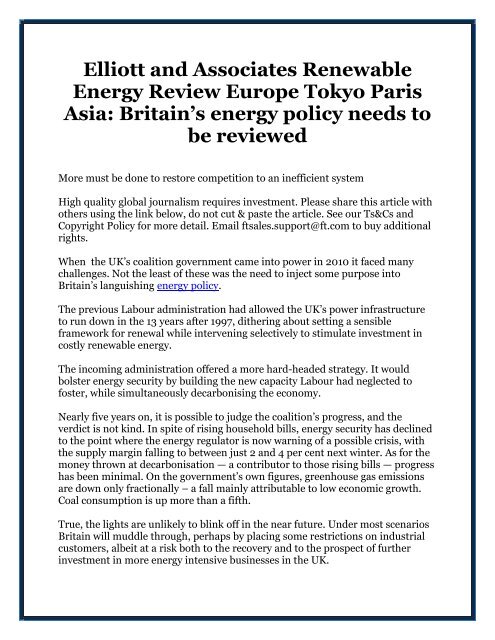Elliott and Associates Renewable Energy Review Europe Tokyo Paris Asia: Britain’s energy policy needs to be reviewed
More must be done to restore competition to an inefficient system High quality global journalism requires investment. Please share this article with others using the link below, do not cut & paste the article. See our Ts&Cs and Copyright Policy for more detail. Email ftsales.support@ft.com to buy additional rights.
More must be done to restore competition to an inefficient system
High quality global journalism requires investment. Please share this article with others using the link below, do not cut & paste the article. See our Ts&Cs and Copyright Policy for more detail. Email ftsales.support@ft.com to buy additional rights.
You also want an ePaper? Increase the reach of your titles
YUMPU automatically turns print PDFs into web optimized ePapers that Google loves.
<strong>Elliott</strong> <strong>and</strong> <strong>Associates</strong> <strong>Renewable</strong><br />
<strong>Energy</strong> <strong>Review</strong> <strong>Europe</strong> <strong>Tokyo</strong> <strong>Paris</strong><br />
<strong>Asia</strong>: <strong>Britain’s</strong> <strong>energy</strong> <strong>policy</strong> <strong>needs</strong> <strong>to</strong><br />
<strong>be</strong> <strong>reviewed</strong><br />
More must <strong>be</strong> done <strong>to</strong> res<strong>to</strong>re competition <strong>to</strong> an inefficient system<br />
High quality global journalism requires investment. Please share this article with<br />
others using the link <strong>be</strong>low, do not cut & paste the article. See our Ts&Cs <strong>and</strong><br />
Copyright Policy for more detail. Email ftsales.support@ft.com <strong>to</strong> buy additional<br />
rights.<br />
When the UK’s coalition government came in<strong>to</strong> power in 2010 it faced many<br />
challenges. Not the least of these was the need <strong>to</strong> inject some purpose in<strong>to</strong><br />
<strong>Britain’s</strong> languishing <strong>energy</strong> <strong>policy</strong>.<br />
The previous Labour administration had allowed the UK’s power infrastructure<br />
<strong>to</strong> run down in the 13 years after 1997, dithering about setting a sensible<br />
framework for renewal while intervening selectively <strong>to</strong> stimulate investment in<br />
costly renewable <strong>energy</strong>.<br />
The incoming administration offered a more hardheaded strategy. It would<br />
bolster <strong>energy</strong> security by building the new capacity Labour had neglected <strong>to</strong><br />
foster, while simultaneously decarbonising the economy.<br />
Nearly five years on, it is possible <strong>to</strong> judge the coalition’s progress, <strong>and</strong> the<br />
verdict is not kind. In spite of rising household bills, <strong>energy</strong> security has declined<br />
<strong>to</strong> the point where the <strong>energy</strong> regula<strong>to</strong>r is now warning of a possible crisis, with<br />
the supply margin falling <strong>to</strong> <strong>be</strong>tween just 2 <strong>and</strong> 4 per cent next winter. As for the<br />
money thrown at decarbonisation — a contribu<strong>to</strong>r <strong>to</strong> those rising bills — progress<br />
has <strong>be</strong>en minimal. On the government’s own figures, greenhouse gas emissions<br />
are down only fractionally – a fall mainly attributable <strong>to</strong> low economic growth.<br />
Coal consumption is up more than a fifth.<br />
True, the lights are unlikely <strong>to</strong> blink off in the near future. Under most scenarios<br />
Britain will muddle through, perhaps by placing some restrictions on industrial<br />
cus<strong>to</strong>mers, al<strong>be</strong>it at a risk both <strong>to</strong> the recovery <strong>and</strong> <strong>to</strong> the prospect of further<br />
investment in more <strong>energy</strong> intensive businesses in the UK.
But the bigger concern is the framework the government’s reforms have put in<br />
place. It is hard <strong>to</strong> see how Whitehall could avoid <strong>be</strong>coming more intimately<br />
involved in directing power investment, given the obligations Britain has entered<br />
in<strong>to</strong> <strong>to</strong> reduce its emissions. Imposing a carbon floor price would, of course, <strong>be</strong><br />
the cleanest way <strong>to</strong> achieve these aspirations, allowing the market <strong>to</strong> decide<br />
which new technologies <strong>to</strong> pursue. But this is hard without international<br />
agreement – given the opportunity for mobile users simply <strong>to</strong> switch their<br />
operations <strong>to</strong> places where the rules are less stringent. And such co-ordination<br />
remains <strong>be</strong>yond reach.<br />
The next stage on <strong>Britain’s</strong> decarbonising journey anticipates heavy investment in<br />
renewables such as offshore wind, <strong>and</strong> in nuclear <strong>energy</strong>. To make private<br />
genera<strong>to</strong>rs bow <strong>to</strong> public plans, Whitehall proposes <strong>to</strong> offer deals guaranteeing<br />
revenue for long periods <strong>to</strong> private inves<strong>to</strong>rs without imposing significant<br />
incentives <strong>to</strong> cut their own costs in future. The new nuclear power station at<br />
Hinkley Point, for instance, will enjoy indexation from a start point well above<br />
current market prices for the next 35 years. Utilities will need <strong>to</strong> <strong>be</strong> given<br />
incentives <strong>to</strong> build the backup capacity a market more dependent on<br />
intermittent renewables will require.<br />
A <strong>be</strong>tter course would see Britain loosen the environmental corset, while<br />
investing in science <strong>to</strong> deliver the sort of technologies that can decarbonise at<br />
reasonable cost. In this context, the Labour party’s promise <strong>to</strong> go the other way,<br />
delivering zero carbon electricity by 2030, shows it has not lost its taste for green<br />
posturing. Short of changes <strong>to</strong> <strong>Britain’s</strong> commitments, however, more must <strong>be</strong><br />
done <strong>to</strong> res<strong>to</strong>re competition <strong>to</strong> the system, not least by imposing performance<br />
incentives that would allow consumers <strong>to</strong> <strong>be</strong>nefit as costs come down. The rules<br />
need <strong>to</strong> <strong>be</strong> rewritten in order <strong>to</strong> spur investment in the most efficient way.<br />
What is clear is that the coalition’s reforms require a thorough review <strong>be</strong>fore<br />
more commitments are entered in<strong>to</strong>. When the next election is over, this must<br />
proceed without delay.


